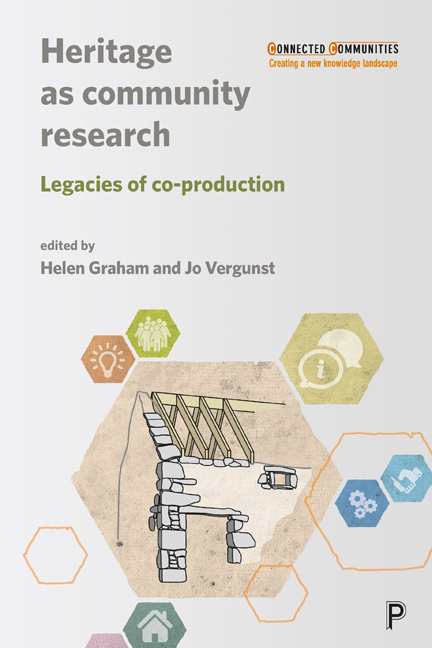Part One - Ways of knowing
Published online by Cambridge University Press: 27 April 2022
Summary
We are using ‘ways of knowing’ to link the first five chapters of this book. By this, we want to indicate that when heritage is framed as a form of community research, it is produced through plural and interacting modes of understanding and making sense of the past in the present. The phrase ‘ways of knowing’ offers a nod to debates in anthropology and participatory and action research, which have drawn attention to knowing as an expansive and ongoing process that might rely as much on feelings, intuition, social interaction and communication as on formal research methods. In these chapters, this more expansive – or ‘extended’ (Heron and Reason, 2001) – epistemology is very much in evidence.
In our first chapter, Jo Vergunst, Elizabeth Curtis, Neil Curtis, Jeff Oliver and Colin Shepherd explore how collaborative archaeological research draws on ‘ecologies of skill’ that ‘bring together landscapes, materials, people and their social interactions’. From this, the notion of an ‘archaeological imagination’ is developed, in which ‘more voices are heard and more people become skilled at working within their own landscapes’. The research is spatially and temporally situated in ways that open up future possibilities for environmental change.
Also concerned with how different ways of knowing – in this case, of singers, musicians and anthropologists – John Ball, Tony Bowring, Fay Hield and Kate Pahl, in Chapter Two, enact the improvisatory mode of their music-making in written form. Through a staging of a sequence reminiscent of both an improvisatory music session and an action research cycle, they explore how the process of ‘do–think–say–write–do’ led, over time, to drawing their differences into a shared framing for making sense of their collaboration and its implication for the transmission of musical heritage.
Chapter Three offers an emphasis on contesting popular representations, with Jodie Matthews drawing attention to the dangerous and damaging stereotypes of the Romani community in the media and on social media. Matthews explores how archives and sharing personal experience offer resources for pluralising and challenging these restricted modes of representation.
Reflecting on their involvement as academics in projects that create digital resources for community heritage groups, Nick Higgett and Jenny Wilkinson, in Chapter Four, show the significance of different expectations, time frames and perceptions to the collaborative process.
- Type
- Chapter
- Information
- Heritage as Community ResearchLegacies of Co-production, pp. 25 - 26Publisher: Bristol University PressPrint publication year: 2019



